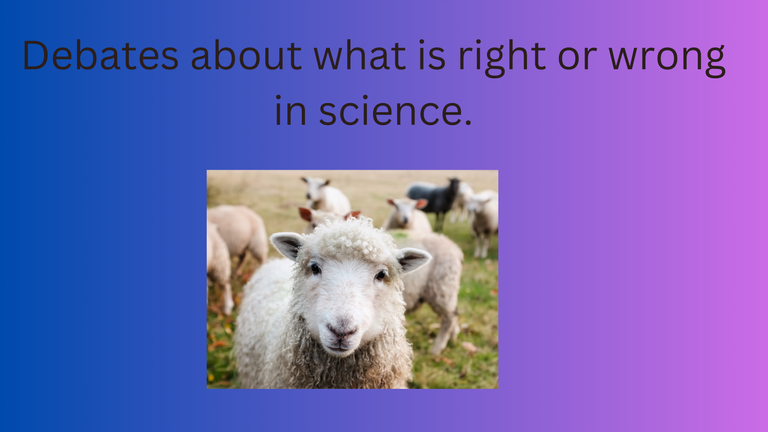Debate about what is right or wrong in science.

Hopefully, that’s my last text using only mobile. I will get my flight back home tonight and I found now I small time to write about a topic that matters to me for obvious reasons. When we go to study biology we need to discuss every time about bioethics. Why? Science influences humanity, other beings, and the environment. So there is a moral discussion about every new study since in the beginning, the design and experiments to the final product. How this research will contribute to the world and what possible bad outcomes it can bring? We could imagine that nuclear fission discovery could lead to a deadly bomb. That’s why there is a need to try to forecast what certain research can lead to bad outcomes.

Science in its history has many developments that are a bit controversial in its roots. For me, something that always bugged me was the first mammal cloned. Dolly, the sheep, was the first mammal clone born in the 90’s. That development opened the eyes of many people who wanted to clone humans. Many movies and books discuss the ethics behind cloning a human being. A while ago a Chinese scientist announced that some babies were cloned and they were already born. The last notice that I heard was that he was in jail because of that. Cloning and improving human genes is very controversial. We can even remember a crazy guy who wanted to create an idea of a perfect human race of blonde and blue-eyed people. Luckily this guy lost the war. What is perfect in our species is very subjective. Improving the life of those born with a defective allele that would kill in a couple of years can be discussed. But then other people will want their child with blue eyes, that can be some trouble. Going back to the cloning problem, some people lose their kids very young in an accident and want them back so badly, cloning would help this person but should we defy the natural order of things in this way? We can argue also that this cloned baby won’t have the same memories and experiences, despite being physically the same it is a different person.
On the other hand, science has many problems in the development of other areas. Mostly because they aren’t interesting for rich countries. I used to work in Brazil in an infectious disease institute and more than 70% of the research there deals with negligence diseases that are more frequent in third-world countries. Tuberculosis for example. The bacteria that causes it was discovered a long time ago. But still, in these countries, there are a large number of people that get infected by it. The vaccine isn’t effective enough and the treatment is long. Some protozoans also are around causing Leishmaniasis, Malaria, and Chagas disease. There aren’t any effective vaccines or good treatments for this diseases. But main science is still concerned with things that concern more rich countries like potent antivirals and anti-tumoral treatments, they are also important diseases but there is a need for a better balance to find new ways to fight other ones that are more forgotten.

Science is beautiful but it can be used for controversial ideas. But don’t worry that most of the scientists need to submit to an ethics department of the institution/ university their project before starting it. Also when a scientist submits to a journal, it needs to have this approval on the article. Still, ethics debates can grow in an innovative discovery/development and the most important is to keep discussing and updating new limits to where we can go.


Esperançosamente, este é meu último texto usando apenas o celular. Vou pegar meu voo de volta para casa hoje à noite e percebi que tenho pouco tempo agora para escrever sobre um tema que me importa, por razões óbvias. Quando estudamos biologia, precisamos discutir sempre sobre bioética. Por quê? A ciência influencia a humanidade, outros seres e o meio ambiente. Portanto, há uma discussão moral sobre cada novo estudo, desde o início, o design e os experimentos até o produto final. Como essa pesquisa contribuirá para o mundo e quais possíveis resultados ruins pode trazer? Poderíamos imaginar que a descoberta da fissão nuclear poderia levar a uma bomba mortal. Por isso, há a necessidade de tentar prever a que resultados ruins certas pesquisas podem levar.

A ciência em sua história tem muitos desenvolvimentos que são um pouco controversos em suas raízes. Para mim, algo que sempre me incomodou foi o primeiro mamífero clonado. Dolly, a ovelha, foi o primeiro clone de mamífero nascido nos anos 90. Esse desenvolvimento abriu os olhos de muitas pessoas que queriam clonar humanos. Muitos filmes e livros discutem a ética por trás da clonagem de seres humanos. Há algum tempo, um cientista chinês anunciou que alguns bebês foram clonados e já nasceram. A última notícia que ouvi foi que ele estava na prisão por causa disso. Clonagem e melhoria dos genes humanos são muito controversos. Podemos até lembrar de um cara louco que queria criar uma ideia de uma raça humana perfeita de pessoas loiras e de olhos azuis. Felizmente, esse cara perdeu a guerra. O que é perfeito em nossa espécie é muito subjetivo. Melhorar a vida daqueles que nascem com um alelo defeituoso que os mataria em alguns anos pode ser discutido. Mas então outras pessoas vão querer que seus filhos tenham olhos azuis, o que pode ser um problema. Voltando ao problema da clonagem, algumas pessoas perdem seus filhos muito jovens em um acidente e os querem de volta tão desesperadamente, a clonagem ajudaria essa pessoa, mas deveríamos desafiar a ordem natural das coisas dessa maneira? Também podemos argumentar que esse bebê clonado não terá as mesmas memórias e experiências, apesar de ser fisicamente o mesmo, é uma pessoa diferente.
Por outro lado, a ciência tem muitos problemas no desenvolvimento de outras áreas. Principalmente porque não são interessantes para países ricos. Eu costumava trabalhar no Brasil em um instituto de doenças infecciosas e mais de 70% das pesquisas lá lidam com doenças negligenciadas que são mais frequentes em países do terceiro mundo. Tuberculose, por exemplo. A bactéria que a causa foi descoberta há muito tempo. Mas ainda nesses países, há um grande número de pessoas infectadas por ela. A vacina não é eficaz o suficiente e o tratamento é longo. Alguns protozoários também estão por aí causando Leishmaniose, Malária e Doença de Chagas. Não há vacinas eficazes ou bons tratamentos para essas doenças. Mas a ciência principal ainda está preocupada com coisas que preocupam mais os países ricos, como antivirais potentes e tratamentos antitumorais, também são doenças importantes, mas há uma necessidade de um melhor equilíbrio para encontrar novas maneiras de lutar contra outras que são mais esquecidas.

A ciência é bela, mas pode ser usada para ideias controversas. Mas não se preocupe, a maioria dos cientistas precisa submeter seu projeto a um departamento de ética da instituição/universidade antes de começar. Além disso, quando um cientista submete a um periódico, é necessário ter essa aprovação no artigo. Ainda assim, os debates éticos podem crescer em uma descoberta/desenvolvimento inovador e o mais importante é continuar discutindo e atualizando novos limites até onde podemos ir.

Posted Using InLeo Alpha
Obrigado por promover a comunidade Hive-BR em suas postagens.
Vamos seguir fortalecendo a Hive
Eu acho bizarro essa questão das vacinas... tanta gente morrendo por uma coisa que já sabe como prevenir/curar, mas que não é 'interessante' pro momento...
Pois é … bem tem gente trabalhando nisso falta so mesmo apoio.
Your post was manually curated by @michupa.
Delegate your HP to the hive-br.voter account and earn Hive daily!
🔹 Follow our Curation Trail and don't miss voting! 🔹
Funny mention vaccines or treatments.
Making vaccines could help millions but as you said low priority because its not a "rich nation disease" but after COVID the question is how much resistance would there be if a vaccine was found :(
Some people have some very odd thoughts on Scientists these days :(
Covid hype was a thing… many governments released big funds
Caramba eu também falei sobre a ovelha Dolly, isso mostra como esse acontecimento marcou a nossa geração, um clone de um animal foi algo incrível e assustador ao mesmo tempo e ficou gravado em nós. Outro detalhe é que a gente já pensa naquele filme do star wars sobre clones, não tem como nao pensar, que os clones podem ser usados apenas para aquilo, como massa de manobra e soldados descartáveis, isso é algo que precisamos pensar muito bem antes de prosseguir com a evolução da clonagem humana.
!PGM !BBH !LOLZ
@gwajnberg! Your Content Is Awesome so I just sent 1 $BBH (Bitcoin Backed Hive) to your account on behalf of @shiftrox. (3/20)
lolztoken.com
Now there is a career in ruins.
Credit: reddit
@gwajnberg, I sent you an $LOLZ on behalf of shiftrox
(3/10)
Cloning was interesting to me since I heard about it from my childhood times. I always wished to see what if there was another clone like me? Later I realized it's not ethical. Many problems can be created for the cloning of human and so it's not allowed to do.
!PIZZA
Hehhehe just in our dreams 😜
$PIZZA slices delivered:
@intishar(3/5) tipped @gwajnberg